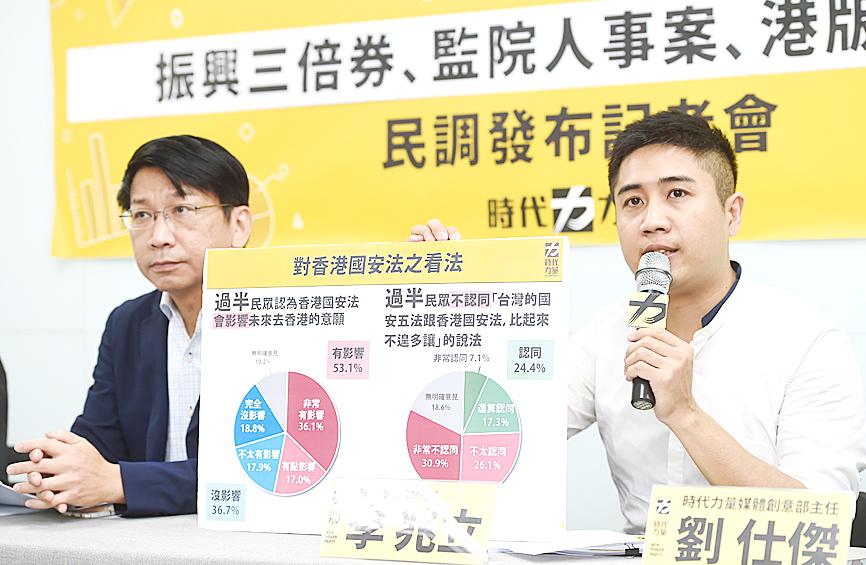More than half of the respondents in a poll said the new national security legislation in Hong Kong affected their willingness to visit the territory, the New Power Party (NPP) said yesterday.
NPP think tank executive director Lee Chao-li (李兆立) said that a survey it commissioned showed that 53.1 percent of respondents said their willingness to visit Hong Kong had been affected by the legislation, while 36.7 percent said they were not affected by it.
The poll showed that respondents with a higher education level were more conscious of how the legislation might affect them and were less willing to visit Hong Kong, NPP creative media director Jerry Liu (劉仕傑) said.

Photo: Fang Pin-chao, Taipei Times
The poll showed that 66.5 percent of people with a bachelor’s degree or higher said the legislation affected their willingness to visit Hong Kong, while 48.1 percent of people with only a junior-high school education and 32.5 percent with only an elementary-school education said they were affected by it.
Although the Mainland Affairs Council has cautioned “high-risk groups” — including people who support independence for Taiwan, Hong Kong, Tibet and Xinjiang and those who have criticized the Chinese or Hong Kong governments — not to travel to the territory, it should do more to warn all Taiwanese about the possible risks in visiting Hong Kong., Liu said.
As the US and China are engaged in a diplomatic dispute, with China ordering the US to close its consulate in Chengdu after the US ordered China to close its consulate in Houston, Taiwan should be prepared if the Chinese government orders Taiwan to close its consulate in Hong Kong, and should protect its documents and expatriates, he said.
Although some academics have warned that after implementing the national security legislation in Hong Kong, China’s next goal might be Taiwan, Lee said the poll showed that 51 percent of respondents said they were confident in Taiwan’s preparedness to confront threats from China, while 40.4 percent said they were not.
The poll showed that 54.6 percent of respondents favored maintaining the “status quo” with China, while 33.4 percent were in favor of independence and 6.4 percent supported unification.
Nearly 30 percent of respondents said they preferred “permanently maintaining the status quo,” which could also be considered being in favor of remaining independent, NPP Chairman Hsu Yung-ming (徐永明) said.
Meanwhile, the poll showed that President Tsai Ing-wen (蔡英文) and Premier Su Tseng-chang (蘇貞昌) have approval ratings of 60.8 and 56.1 percent respectively, which remains about the same as the previous survey.
However, their disapproval ratings have both increased — by 5 percentage points to 30.1 percent for Tsai and 4.1 percentage points to 35.7 percent for Su, Hsu said.
The poll also showed that 70.4 percent of people surveyed said they considered the procedure for purchasing the government-issued Triple Stimulus Vouchers convenient.
Most people said they would spend the vouchers at department stores and hypermarkets (57.7 percent) or convenience stores and supermarkets (33.1 percent), rather than at restaurants or night markets, as the government had promoted, Hsu said, adding that the actual effects of the vouchers should be observed.
The poll was conducted on July 18, and Monday and Tuesday last week, collecting 1,095 valid samples with a margin of error of 3 percentage points.

The manufacture of the remaining 28 M1A2T Abrams tanks Taiwan purchased from the US has recently been completed, and they are expected to be delivered within the next one to two months, a source said yesterday. The Ministry of National Defense is arranging cargo ships to transport the tanks to Taiwan as soon as possible, said the source, who is familiar with the matter. The estimated arrival time ranges from late this month to early next month, the source said. The 28 Abrams tanks make up the third and final batch of a total of 108 tanks, valued at about NT$40.5 billion

Two Taiwanese prosecutors were questioned by Chinese security personnel at their hotel during a trip to China’s Henan Province this month, the Mainland Affairs Council (MAC) said yesterday. The officers had personal information on the prosecutors, including “when they were assigned to their posts, their work locations and job titles,” MAC Deputy Minister and spokesman Liang Wen-chieh (梁文傑) said. On top of asking about their agencies and positions, the officers also questioned the prosecutors about the Cross-Strait Joint Crime-Fighting and Judicial Mutual Assistance Agreement, a pact that serves as the framework for Taiwan-China cooperation on combating crime and providing judicial assistance, Liang

A group from the Taiwanese Designers in Australia association yesterday represented Taiwan at the Midsumma Pride March in Melbourne. The march, held in the St. Kilda suburb, is the city’s largest LGBTQIA+ parade and the flagship event of the annual Midsumma Festival. It attracted more than 45,000 spectators who supported the 400 groups and 10,000 marchers that participated this year, the association said. Taiwanese Designers said they organized a team to march for Taiwan this year, joining politicians, government agencies, professionals and community organizations in showing support for LGBTQIA+ people and diverse communities. As the first country in Asia to legalize same-sex

MOTIVES QUESTIONED The PLA considers Xi’s policies toward Taiwan to be driven by personal considerations rather than military assessment, the Epoch Times reports Chinese President Xi Jinping’s (習近平) latest purge of the Chinese People’s Liberation Army (PLA) leadership might have been prompted by the military’s opposition to plans of invading Taiwan, the Epoch Times said. The Chinese military opposes waging war against Taiwan by a large consensus, putting it at odds with Xi’s vision, the Falun Gong-affiliated daily said in a report on Thursday, citing anonymous sources with insight into the PLA’s inner workings. The opposition is not the opinion of a few generals, but a widely shared view among the PLA cadre, the Epoch Times cited them as saying. “Chinese forces know full well that